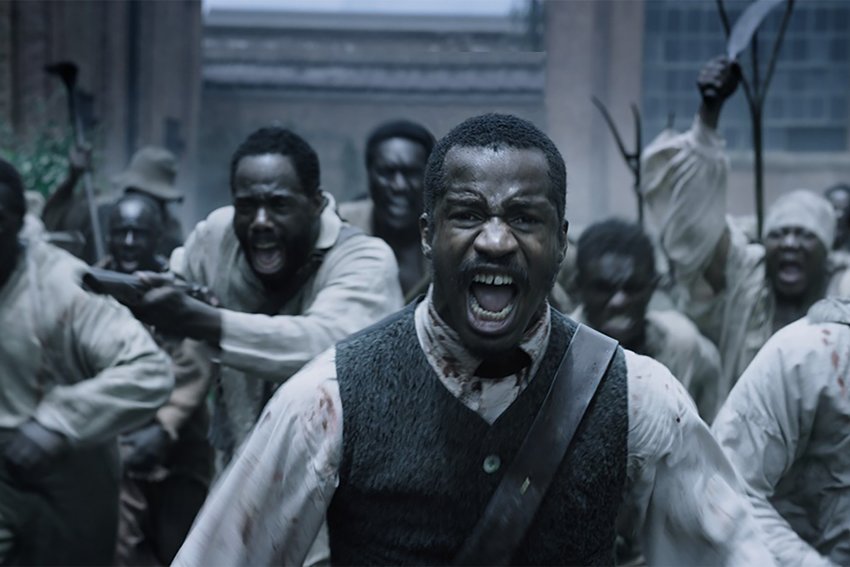
Politically muddled and aesthetically and narratively banal, Nate Parker’s “The Birth of a Nation” ultimately fails to fulfill its many ambitions. It feels less like a personal passion project and more like a calculated and calibrated piece of off-Hollywood awards bait.
The film tells the story of Nat Turner (Nate Parker), a slave who, after being taught how to read by his master’s wife (Esther Scott), learns the Bible and becomes a preacher for his fellow slaves at the plantation. The son of Turner’s master, Samuel Turner (Armie Hammer), decides it would be lucrative to loan out Turner to other slave owners, so that he might preach messages of submission and docility to his fellow slaves. It is on these trips to other farms and plantations that Turner witnesses the depth and breadth of the evils of American slavery. This inspires him to lead a violent, 48-hour slave revolt, killing many white, slave-owning families across the southern countryside.
That brief synopsis only gives a half-truth about Turner, or at least the character portrayed in the film. Turner was motivated by racial oppression and religious fervor, but he also had a additional motivation: rape. The religious issue comes to play in the film and leads to an intriguing — but ultimately undercooked and one-sided — exploration of the role religion plays in the lives of Americans, especially Black Americans. But the issue of sexual violence has no such promise or nuance and reveals the ugly sexism and machismo at the heart of the film.
Twice in the film, women close to Turner are the victims of rape. The first, his wife Cherry (Aja Naomi King), is also beaten horrifically by the three white men who violate her. This leads Turner to swear revenge on the perpetrators, and in the final climactic battle sequence, he comes face-to-face with the villainous man who not only raped his wife but has also tormented him since childhood.
The second victim, Esther (Gabrielle Union), the wife of Nat’s friend, Isaac (Dwight Henry), is “given” to a visiting white man by Samuel. Esther is given no voice or say in the matter, though Isaac refuses to give his wife to another man, and the film mostly focuses on the men’s reactions to the event. The most we ever see of Esther’s view is her exiting the house, crying, after the assault has occurred.
These two scenes would have been troubling regardless, but become especially problematic in light of Parker’s college rape scandal while at Penn State in 1999 and his poor handling of the situation. I feel comfortable calling Parker a repugnant misogynist, and the film reflects these regressive attitudes. Union, for example, arguably the film’s most high profile actor, is given two minutes of screen time at best and has no lines of dialogue. She has spoken out on the scandal, thankfully, using her voice in ways she wasn’t allowed to in the film.
But these attitudes not only hinder the film for the obvious moral and political reasons, they also contradict and dilute the more positive point of the film. By centering on a historical narrative of African-Americans rebelling against systemic oppression, the film is clearly drawing parallels to the current Black Lives Matter movement and other protests against racial inequality, attempting to validate them and give them a cinematic voice. But the film also purports a worldview where women, black women in particular, are subservient to men. Where they are essentially men’s property and are only meant to provide motivation and support. The film voices a message of anti-racial oppression while unintentionally voicing a contradictory message of pro-gender oppression. It’s hard to take seriously a film decrying the lack of freedom for one group while ignoring that lack for another. I wonder if Parker would ever make a movie about women similarly rising up violently against their male oppressors, like last year’s “Suffragette.” Something tells me he wouldn’t.
On top of all this, the film is utterly banal in form and narrative execution. Parker seems to be concerned only with the climactic revolt and its aftermath, and the drama and setup preceding those last 30-40 minutes of the film are sluggish and clichéd. It’s packed with slavery drama tropes like a whipping scene, a “nice” slave owner contrasted with an “evil” one, liberal use of the N-word and the aforementioned rape of female slaves. I don’t mean to make light of the horrors of slavery or films made about it, but when it’s treated as banal and commonplace as it is here, this type of narrative gets sucked into the Hollywood Industrial Complex and loses its artistry, its ability to speak to and deal with America’s original sin. Instead, it becomes a collection of tired clichés that, once again, exploit the experience of black Americans for profit and prestige.
Finally, if this was such a passion project for Parker, why do I feel no passion in its filmmaking? I saw few original, surprising shots and none that made any lasting impression. The cinematography is pretty but little more, the editing choppy to the point of incoherence and the score conventional, with the expected mournful yet stirring string arrangements. All this adds up to a façade of inspiration. It hits all the right notes, but it’s got no soul.
Nat Turner’s story is a fascinating and worthy one, and it’s especially relevant in these tumultuous times. It’s a story that needs to be told. But Nate Parker was not the right person to tell it.
Support City Pulse - Donate Today!
Comments
No comments on this item Please log in to comment by clicking here